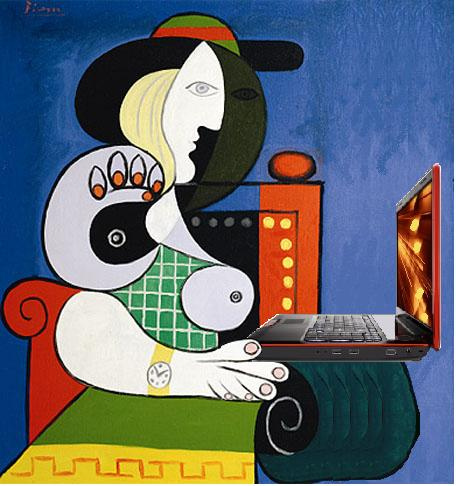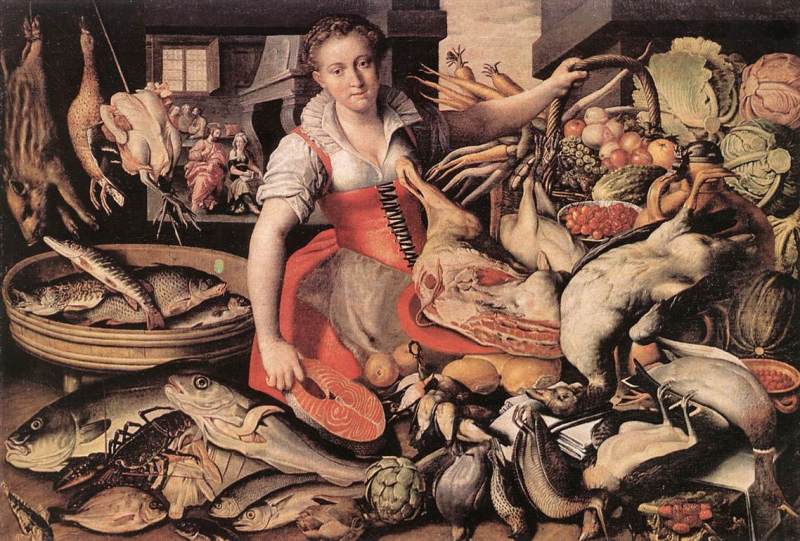Now when Jesus heard that John was arrested, he went to Galilee. Leaving Nazareth, he went to live in Capernaum by the sea, in the region of Zebulun and Naphtali, to fulfill what was spoken through Isaiah the prophet, saying,
“The land of Zebulun and the land of Naphtali,
toward the sea, beyond the Jordan,
Galilee of the Gentiles,
the people who sat in darkness saw a great light,
to those who sat in the region and shadow of death,
to them light has dawned.”
From that time, Jesus began to preach, saying, “Repent, because the Realm of Heaven is near!”
Walking by the sea of Galilee, he saw two brothers: Simon, known as Peter, and Andrew, his brother, casting a net into the sea — because they were fishermen. He said to them, “Follow me, and I will send you out to fish for people.”
They immediately left their nets and followed him. Going on from there, he saw two other brothers, James the son of Zebedee and John his brother, mending their nets in the boat with their father Zebedee. They immediately left the boat and their father and followed him.
Jesus went about in all Galilee, teaching in their assemblies preaching the Good News of Godde’s Realm, and healing every disease and sickness among the people (Matthew 4:12-23, New Testament: Divine Feminine Version*).
This last Sunday our deacon at church, Tim, preached a powerful sermon on this passage. First I have to change a word in verse 12. In the NRSV it says: “Now when Jesus heard that John had been arrested, he withdrew to Galilee” (emphasis mine). Tim pointed out that to withdraw was to make a tactical retreat. Retreat? Jesus? Then Tim pointed out that this was the third tactical retreat in the Gospel of Matthew. This is only chapter 4 of Matthew’s Gospel, and Jesus has retreated three times? Really?
This Gospel does not start out in Galilee as Luke’s story does. In Luke Mary and Joseph start out in Nazareth, go to Bethlehem for the census where Jesus was born, then they returned to Nazareth. Matthew does not start in Galilee. There is no census in Matthew’s story. In Matthew, Mary and Joseph were in Bethlehem: they lived there. We see this when the Magi arrived to pay homage to the newborn king: when they “entered the house and saw the young child with Mary, his mother, [they] fell down and bowed to him” (Matthew 2:11). Unlike all the nativity scenes you see over Christmas, the magi did not come to the stable. There isn’t even a stable in Matthew. There is a house: Mary and Joseph’s home.
In Matthew’s Gospel Mary and Joseph are in Judea because that’s where the Messiah is supposed to be. Judah was the son of Leah and Jacob that Israel’s kings were descended from. Jerusalem, Judah’s capitol, was in the territory of Judah. Bethlehem where David was born, was in the neighboring territory of Benjamin. Eventually Judah would absorb Benjamin, and this is where the line of David began. Judah, in Jesus’ time called Judea, was where the Messiah, the Son of David was to be born. Bethlehem and Judea were supposed to be the home of the Messiah, who would save Judea from foreign powers. But Mary and Joseph could not stay in Bethlehem after the Magi’s visit.
Being warned in a dream that they shouldn’t return to Herod, they went back to their own country another way.
Now when they had left, an angel of the Lady appeared to Joseph in a dream, saying, “Arise and take the young child and his mother, flee to Egypt, and stay there until I tell you, because Herod will try to kill the young child.”
He got up, took the young child and his mother by night, went to Egypt, and stayed there until the death of Herod to fulfill what was spoken by the Lady through the prophet, saying, “Out of Egypt I called my son (vv. 12-25).”
The reason Godde warned Joseph to go to Egypt was that Herod was about to go on a killing spree. When the magis didn’t return to him, Herod became infuriated, and to remove the threat to his throne, he had all the boys under the age of two in Bethlehem slaughtered. Instead of raising Jesus in Judea, Plan A, Mary and Joseph were now refugees in Egypt, what they considered Plan B.
We don’t know how many years they stayed in Egypt before Godde sent Joseph another dream:
But when Herod was dead, an angel of the Lady appeared in a dream to Joseph in Egypt, saying, “Arise and take the young child and his mother to Israel, because those who sought the young child’s life are dead.”
He got up and took the young child and his mother to Israel. But when he heard that Archelaus was ruling Judea in the place of his father, Herod, he was afraid to go there. Being warned in a dream, he went to the region of Galilee and moved to a town called Nazareth (vv. 19-23).
Herod the Great, the king who killed anyone to secure his throne (including one of his wives and two of his sons) was dead. Mary and Joseph thought they were returning home to Bethlehem, to Judea, and back to the plan. But when they arrived in Judea they discovered Archelaus, a tyrant after his father’s heart, was king. Another dream. Another trip. Another home. In Galilee. The hinterlands of Israel. The part of Israel that was known for being a home to half-breeds and Gentiles. It was the hinterlands, barely a part of Israel, far away from the center of power, far away from the home of David, and the line of David. They were on the wrong side of the tracks. Plan C had taken place. As leaders in Jerusalem would later say: “Search the Scriptures: no prophet has ever come out of Galilee. This guy is not the Messiah.” But that was why Galilee was the perfect place to be: no one would suspect a threat to the throne, the King of Jews, to be living in the borderlands of Galilee.
Several years passed between the end of Matthew 2 and beginning of Matthew 3. A rough and tumble prophet named John the Baptist was preaching repentance of sins and the coming of the Kingdom Godde. John was in the Judean wilderness (we’re now back on the right side of the tracks), and Jesus was there. Jesus was back where he was supposed to be: in Judea. John baptized Jesus at end the of Matthew 3, and Godde declared Jesus to be her “beloved son.” In the first part of Matthew 4 we read of Jesus’ temptations. He resisted the devil and passed the test. He was set to begin his ministry as the Messiah, and he was in the right place: Judea, home of the Davidic kings. He was finally where is he was supposed to be.
Then there was another bump in the road: John was arrested. When Jesus heard of the arrest, “he withdrew to Galilee,” so he wouldn’t be arrested too. Another tactical retreat. The start of Plan D. Far away from the power center of Israel, in the hinterlands of Galilee, filled with half-breeds, Gentiles, and peasants, Jesus found his footing. On the margins, among the poorest of the poor, Jesus began to preach “The Kingdom of Godde is among you,” and the Gospel took off. Jesus spent three years in Galilee in Matthew. The success of his ministry in Galilee finally brought him to Jerusalem.
May be Plan D was Godde’s Plan A.
I always feel like I’m working in the hinterlands. Out on the margins. That I won’t be heard, and if I am heard, I won’t be taken seriously. After all I’m not in any of the power centers of theological feminism. I’m not a Ph.D., and I have no interest in pursuing a doctorate. I’m not in academia as a student or teacher where the “action” is, and I don’t want to be there. I’m not a part of the secular feminist movement because there doesn’t seem to be room for religion, and honestly, it does not interest me. I’m just a woman sitting in her living room with a laptap and passion to see women who have been held in bondage by religion set free.
And we won’t even talk about what Plan I’m on. First a pastor then missionary then pastor again and church planter, and there have been several writer incarnations in the past four years as well. I get tired of changing plans: I want to be in Judea, doing what I’m going to do for the rest of my life, without all of these side trips to the hinterland.
I’m a woman who is tired playing the Good Ole Boy’s game of using 8 verses out of the over 30,000 verses in the Bible to slap women down and tell them there place is in the home raising children and no place else; that they have no voice in church because of these measly 8 verses. I’m tired of having to prove that I have a Godde-given right to be an equal partner in my marriage and be a leader in the church. I’m tired of having to prove that I, as a woman, am a human being, made in the image of Godde, called to preach the Gospel.
I want to change the rules of the game. I want to create a new playing field. I’m off the defense. I am now leading the offense and playing my game. That game includes showing the sheer absurdity of letting 8 verses out of 31,102 verses condemn women to a lifetime of submission and silence when there are so many more verses in the Bible showing:
- Women speaking their minds
- Making different decisions than their husbands
- Being leaders in both the secular realm and sacred realm
- Shaping the covenants with Israel and the Church by their decisions and actions
- Being powerful leaders of both men and women in the Early Church
I want to the rest of the Biblical witness to interpret these eight verses and put them in their proper place and context.
That is exactly what I’m doing. I’m writing my first E-book in that will be the first in a series called What You Didn’t Learn in Sunday School. The first book is Women Who Didn’t Shut Up and Sit Down. This book will begin to show my offensive. It will show how I’m going to play this game from now on. And as I do this I’m going to remember where Jesus started: the hinterlands, the margins. His ministry did not begin with fireworks in Jerusalem. It’s okay to be out on the margins, in the borderlands.
Before going to church Sunday, I was listening to NPR’s Being. Kristen Tippett interviewed Francis Kissling. Francis noted that most of her work has taken place on the margins. She said that’s where all change has to begin: at the margins. Because the people in the middle–the Status Quo–do not want to change. Change cannot begin there. So I will continue right here in my living room, on my laptop, working on the margins. Jesus was heard. Francis was heard. May be I will be heard too.
Because Plan D or Plan M or Plan W for us can be Plan A for Godde.
*Unless otherwise stated all Scripture is taken from the New Testament: Divine Feminine Translation.


